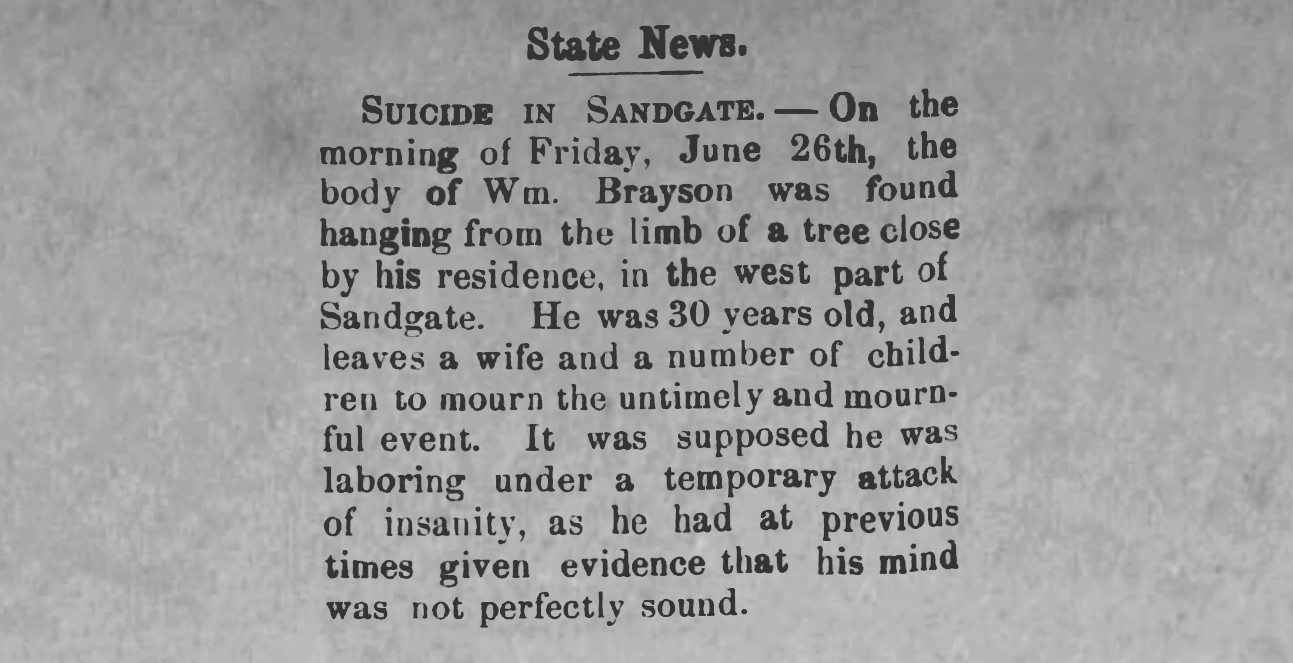SUICIDE IN SANDGATE
(WILLIAM BRAYSON WAS NOT INSANE)
 August 21, 2023
August 21, 2023
I'm often asked by adopted people if I am able to find health related information about their families. That's sometimes the main reason adoptees start their research. Knowing if you're at risk of a hereditary disease is important, not only for yourself, but for your children as well. Getting information about your biological family may not be possible if you had a closed adoption. Genealogy sites can make it possible to find valuable information though. Not only can they help you find your birth parents, you might find a lot more. Here's an example... Some states make death certificates public record. Anyone is free to view them and they are easy to find on Ancestry.com. They are a great source of information, as are obituaries. There's a lot of information out there and it can sometimes be used to track a family's health history over a long period of time.
This story doesn't involve an adoptee. I was researching for my mother-in-law, Pat. It is well known in her family that Huntington's Disease (HD) is hereditary and has caused a lot of early deaths. She was lucky enough to not inherit it. For those of you who don't know, HD is a horrible illness that will kill you in your forties, thirties, or even sooner. It's a hereditary disease that causes the breakdown of nerve cells in the brain. It usually causes involuntary body movements and postures (Chorea) as well as other problems. Chorea is from the Greek word "dance." Some people don't develop the dance-like movements, but instead get stiff. HD is caused by a faulty gene, and there is no cure. It worsens over time until you are unable to function in daily life. If one parent has the abnormal gene, their children will have a fifty percent chance of developing the disease. Most people choose not to have children if they are a carrier of the faulty gene. I won't pretend to be an expert on HD, but I know one thing for sure, you won't live a long and happy life if you have it.
Pat's family was from Vermont, which happens to be one of the states that has publicly available death certificates. While making her family tree, I was able to see how everyone died and at what age. It was quite shocking. The death rate from HD was well over fifty percent. In fact, entire families were being wiped out by it. Her mother died from it, as did her brother, grandmother, great-grandmother, great-great grandfather and countless cousins. Every generation had families with young deaths from HD. I don't think anyone made it past age forty-six, and there were even some deaths before age thirty.

While researching, I came across this newspaper article about Pat's great-great-grandfather, William Brayson, from way back in 1868. It mentioned that he hung himself at age thirty due to temporary insanity. I knew right away, William Brayson was not insane, he had Huntington's Disease. Before people knew what HD was, everyone assumed you were either insane or possessed by demons, which is why you would have the chaotic dance-like movements. Suicide was common in this situation. William also had a grandson who committed suicide by shooting himself in the head. Perhaps he was showing signs of the illness as well. I also noticed that both of William's parents lived to be about eighty years old. I found that interesting because my understanding was, one parent had to be a carrier of the disease. They could not have had it and lived that long. I've also heard, HD does not skip a generation. If neither of your parents had it, you can't inherit it. It's quite possible William Brayson was "patient zero" in this family. He was the first to have the faulty gene and it continues to be passed down through the family today. It's amazing what you can discover over one-hundred and fifty years later.
In a previous post, I briefly mentioned how I sometimes discover people aren't biologically related to the family they thought. They sometimes are in denial, or choose not to believe it. Sometimes, they choose to keep it a secret from their family members. I understand it can be upsetting, but you should consider the medical history part of this. Ignoring this type of thing can lead to an early death for you or future generations of your family. As scary as that sounds, it's true. For example, if you found out your grandfather was really a different man, it might be important to find out all you can about your real grandfather. Perhaps he died of a hereditary illness that could be prevented or controlled if you took the proper precautions. Finding out about your real family and medical history can be very valuable. Even if you know your real family, it's worth looking into people's cause of death. Or, at least, maybe you'll find out the William Braysons in your family weren't really insane either.
REFERENCES
•Orleans Independent Standard, Irasburgh, Vermont, July 28th, 1868
Coming up next, try to find a birth parent with my genealogy tutorial.

